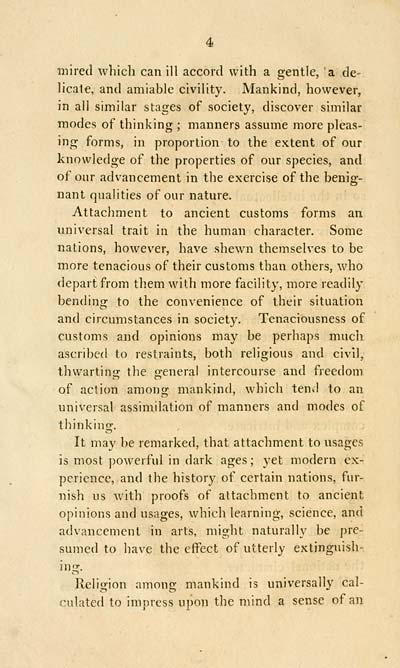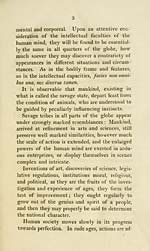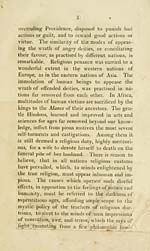Download files
Complete book:
Individual page:
Thumbnail gallery: Grid view | List view

4
mired which can ill accord with a gentle, a de-
licate, and amiable civility. Mankind, however,
in all similar stages of society, discover similar
modes of thinking ; manners assume more pleas-
ing forms, in proportion to the extent of our
knowledge of the properties of our species, and
of our advancement in the exercise of the benig-
nant qualities of our nature.
Attachment to ancient customs forms an
universal trait in the human character. Some
nations, however, have shewn themselves to be
more tenacious of their customs than others, who
depart from them with more facility, more readily
bending to the convenience of their situation
and circumstances in society. Tenaciousness of
customs and opinions may be perhaps much
ascribed to restraints, both religious and civil,
thwarting the general intercourse and freedom
of action among mankind, which tend to an
universal assimilation of manners and modes of
thinking.
It may be remarked, that attachment to usages
is most powerful in dark ages ; yet modern ex-
perience, and the history of certain nations, fur-
nish us with proofs of attachment to ancient
opinions and usages, which learning, science, and
advancement in arts, might naturally be pre-
sumed to have the effect of utterly extinguish-
ing.
Religion among mankind is universally cal-
culated to impress upon the mind a sense of an
mired which can ill accord with a gentle, a de-
licate, and amiable civility. Mankind, however,
in all similar stages of society, discover similar
modes of thinking ; manners assume more pleas-
ing forms, in proportion to the extent of our
knowledge of the properties of our species, and
of our advancement in the exercise of the benig-
nant qualities of our nature.
Attachment to ancient customs forms an
universal trait in the human character. Some
nations, however, have shewn themselves to be
more tenacious of their customs than others, who
depart from them with more facility, more readily
bending to the convenience of their situation
and circumstances in society. Tenaciousness of
customs and opinions may be perhaps much
ascribed to restraints, both religious and civil,
thwarting the general intercourse and freedom
of action among mankind, which tend to an
universal assimilation of manners and modes of
thinking.
It may be remarked, that attachment to usages
is most powerful in dark ages ; yet modern ex-
perience, and the history of certain nations, fur-
nish us with proofs of attachment to ancient
opinions and usages, which learning, science, and
advancement in arts, might naturally be pre-
sumed to have the effect of utterly extinguish-
ing.
Religion among mankind is universally cal-
culated to impress upon the mind a sense of an
Set display mode to: Large image | Transcription
Images and transcriptions on this page, including medium image downloads, may be used under the Creative Commons Attribution 4.0 International Licence unless otherwise stated. ![]()
| Early Gaelic Book Collections > Ossian Collection > Thoughts on the origin and descent of the Gael > (16) |
|---|
| Permanent URL | https://digital.nls.uk/82234636 |
|---|
| Description | Selected books from the Ossian Collection of 327 volumes, originally assembled by J. Norman Methven of Perth. Different editions and translations of James MacPherson's epic poem 'Ossian', some with a map of the 'Kingdom of Connor'. Also secondary material relating to Ossianic poetry and the Ossian controversy. |
|---|
| Description | Selected items from five 'Special and Named Printed Collections'. Includes books in Gaelic and other Celtic languages, works about the Gaels, their languages, literature, culture and history. |
|---|

